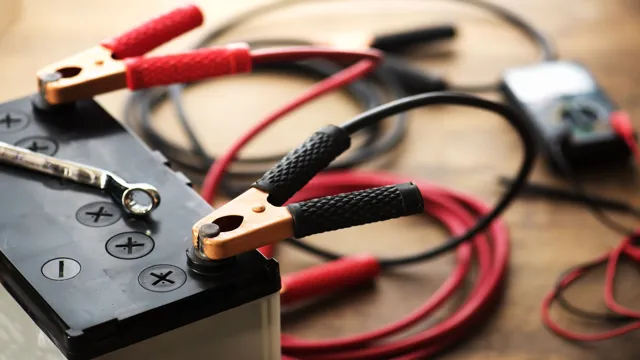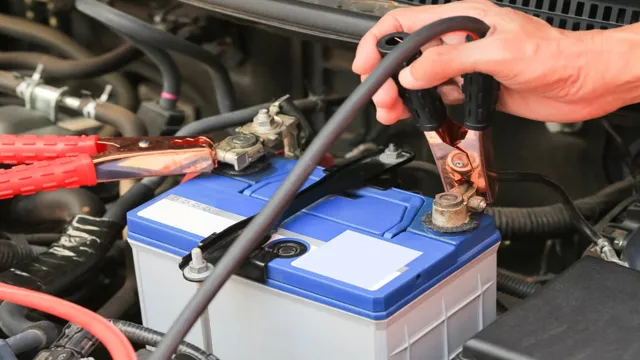Uncovering the Truth: Is the Battery of your Electric Car Warrantied? Explained!
As electric cars become more popular, one of the primary concerns of potential buyers is the warranty coverage of their batteries. After all, electric car batteries are a significant investment, and the last thing you want is to be left with a dead battery before your warranty has expired. Fortunately, most electric car manufacturers offer generous warranty coverage for their batteries, assuaging any fears buyers may have.
In this blog, we’ll go over everything you need to know about electric car battery warranties, including what they cover, how long they last, and what to look out for. So, buckle up and get ready to learn all about the ins and outs of electric car battery warranties!
Understanding Warranties
If you’re considering purchasing an electric car, one of the questions you may have is whether the batteries of these vehicles are warrantied. The good news is that most electric car batteries are indeed covered by a warranty. However, the length and specific details of the warranty can vary depending on the manufacturer and the model of the car.
Some carmakers offer extended warranties that can cover the battery for up to ten years or a certain amount of miles driven. It’s important to check the warranty details before making your purchase, as the battery replacement cost can be a hefty expense if it fails outside of the warranty period. Keep in mind, though, that properly maintaining the battery and the car’s charging habits can help to prolong the battery’s life and prevent costly repairs in the future.
So, if you’re considering an electric car, rest assured that most manufacturers offer warranties for the batteries, and taking care of it can protect you from any unforeseen costs down the road.
What is a warranty and why is it important?
A warranty is an agreement made by a manufacturer or seller that they will repair or replace any faulty products within a specific period. It is important because it provides customers with assurance and protection against defects or damage that may occur after they have purchased a product. Warranties vary in duration, coverage, and terms, so it is vital to read the details carefully before making a purchase.
For example, some warranties may only cover manufacturing defects, while others may cover accidental damage or wear and tear. Understanding the terms of a warranty can help you make an informed decision about whether to purchase a product and give you peace of mind that you are protected if something goes wrong. Putting it simply, a warranty is like an insurance policy for your purchase, providing a safety net for your investment and preventing you from having to bear the full cost of any defects or damage that may occur.

Types of warranties available for electric car batteries
When purchasing an electric car, one important factor to consider is the type of warranty provided for the battery. There are several warranties available, and understanding them is crucial to ensure buyers get the best deal. A comprehensive warranty, for example, covers the cost of repairs or replacements of battery components that malfunction due to defects or faulty workmanship.
A powertrain warranty, on the other hand, is more limited and covers only the motor, transmission, and other components that transfer power to the wheels. Some manufacturers also offer a battery capacity warranty that guarantees a certain level of energy storage capacity for a specified period, often up to eight years or more. It is essential to read the terms and conditions of the warranty carefully to determine what is covered, what is excluded, and what actions might void the warranty.
Overall, having a good understanding of the available warranties ensures that electric car buyers get the best value for their money and peace of mind knowing their battery is covered.
Manufacturer Warranty Coverage
When it comes to electric cars, one question that pops up frequently is whether the batteries are covered under manufacturer warranty. The short answer is yes – most electric car manufacturers offer a warranty on their batteries, which can range from eight to ten years depending on the brand. In addition, different companies have their own policies on what is considered as covered under the warranty.
While some cover the replacement or repair of a faulty battery, others may cover the degradation of the battery over time. It is important to note that the specific terms and conditions of the warranty can vary depending on the manufacturer and vehicle model. In any case, it is always advisable to read the fine print and consult with the dealer or manufacturer to fully understand the extent of the warranty coverage.
So if you’re considering buying an electric car, you can rest assured that the battery, which is a vital component of the vehicle, is typically warrantied by the manufacturer and won’t be a cause for worry!
Details of battery warranties offered by popular electric car manufacturers
Electric car manufacturers offer varying battery warranties depending on the brand and model. One of the popular electric car brands, Tesla, provides an eight-year or 150,000-mile warranty coverage for its Model S, Model X, and Model Their battery warranty covers defects in materials and workmanship, as well as when the battery capacity drops below a certain level.
Meanwhile, Nissan offers an eight-year or 100,000-mile warranty for the LEAF battery capacity and defects in workmanship and material. Chevrolet, on the other hand, provides an eight-year or 100,000-mile warranty coverage for the Bolt EV battery pack. It covers any defects in material and workmanship, but not if the problem is due to wear and tear.
Electric car buyers must be aware of the manufacturer’s warranty coverage to ensure they get the best deal and protection for their investment.
Factors that affect battery warranty coverage
When it comes to battery warranties, one of the most important factors to consider is the manufacturer warranty coverage. This is the level of protection offered to you by the company who made the battery and can vary quite significantly depending on the brand and model. Some manufacturers may offer warranty coverage for up to 10 years, while others may only offer a year or two.
It’s important to note that the length of the warranty coverage doesn’t necessarily always reflect the quality of the battery, so it’s important to do your research and read reviews before making a purchase. Keep in mind that different types of batteries (such as lithium ion or lead-acid) may also come with different types of warranty coverage, so be sure to check the details before making a decision. By choosing a battery with strong manufacturer warranty coverage, you can have peace of mind knowing that you’re protected against any defects or malfunctions that may arise.
How to make a warranty claim if necessary
Making a warranty claim can be a headache but having manufacturer warranty coverage can give you peace of mind. If you ever encounter any issues with the product, you should first check the terms and conditions of the warranty. Some warranties may require you to contact the manufacturer directly while others may require you to go through the retailer or seller.
Gathering all the necessary information about the product such as the serial number, purchase date, and proof of purchase could make the process easier and quicker. Most manufacturers have a warranty claim form available on their website to fill out, submit, and track your claim. It’s important to keep in mind that warranty coverage may not include damages caused by misuse or accidental damage.
If the warranty claim is approved, the manufacturer may either repair or replace the product. By following these steps and understanding the warranty coverage, you can easily avoid the frustration and get the maximum value out of your purchase.
Extended Warranty Options
If you’re considering purchasing an electric car, you may be wondering about the warranty that comes with it. One common question is whether or not the batteries in electric cars are warrantied. The answer is yes, they are typically covered under warranty.
However, the length and extent of the warranty can vary depending on the make and model of the car. It’s important to note that some manufacturers may offer extended warranty options for the battery specifically, which can provide added peace of mind. These extended warranties can be worth considering if you plan to keep your electric car for many years.
Overall, understanding the warranty options for an electric car, including the battery, can help you make an informed decision when purchasing.
Pros and cons of extended warranties for electric car batteries
When it comes to electric cars, one of the biggest concerns for potential buyers is the battery life and reliability. That’s why many automakers offer extended warranty options for electric car batteries. These options can give owners peace of mind, knowing that they won’t be stuck with a hefty repair bill if something goes wrong.
However, there are pros and cons to consider when deciding whether or not to opt for an extended warranty. On the one hand, an extended warranty can save you money in the long run by covering the cost of repairs or replacement. On the other hand, these warranties can be expensive and may not always be worth the additional cost.
It’s important to weigh the potential benefits and drawbacks before making a decision, taking into account factors such as the cost of the warranty, the likelihood of needing repairs, and the potential cost savings. Ultimately, the decision whether or not to purchase an extended warranty for your electric car battery is a personal one, and should be based on your individual needs and circumstances.
What to look for in an extended warranty
When it comes to extended warranties, it’s important to do your research and determine what options are available to you. Some warranties may cover only specific parts of your product, while others may cover everything from accidental damage to normal wear and tear. It’s also important to consider the length of the warranty and the cost.
You don’t want to pay for a long-term warranty that won’t be worth it in the end. Make sure to read the fine print and understand what the warranty covers and what it doesn’t. And always consider the reputation of the company offering the warranty.
Look for reviews and ask for recommendations from friends and family, so that you can have peace of mind knowing that you are protected by a trustworthy warranty.
Conclusion
In conclusion, the warranty on batteries in electric cars may vary depending on the manufacturer and their policies. Some may offer longer warranty periods while others may have more restrictive conditions. Ultimately, it’s important to do your research and consider the warranty as just one factor in choosing an electric vehicle.
After all, the real warranty is the long-term benefits to our planet and the future generations that come after us.”
FAQs
What is the typical battery warranty for an electric car?
The length of the battery warranty can vary depending on the manufacturer, but it is typically around 8 years or 100,000 miles.
Are there any additional warranties or protections for electric car batteries?
Some manufacturers offer extended warranty options for their electric car batteries. It is also worth checking if your car insurance covers any battery related issues.
How do I know if my electric car battery is covered under warranty?
You can check your car’s warranty documentation or contact your car manufacturer’s customer support to confirm if your battery is still under warranty.
What factors affect the longevity of an electric car battery?
The lifespan of an electric car battery can be affected by factors such as usage patterns, temperature, and charging habits. It is important to follow the manufacturer’s guidelines for best practices in battery care and maintenance to maximize its longevity.





